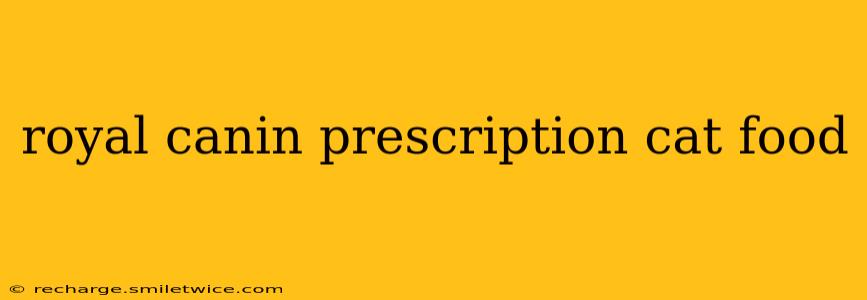Royal Canin is a globally recognized brand renowned for its veterinary-formulated pet food. Their prescription diets are specifically designed to address various feline health concerns, offering targeted nutritional support for optimal well-being. This comprehensive guide dives deep into Royal Canin prescription cat food, exploring its benefits, different ranges, and how to determine if it's the right choice for your cat.
What Makes Royal Canin Prescription Cat Food Different?
Royal Canin prescription diets aren't available over the counter. They're only accessible through veterinarians, who can assess your cat's health needs and recommend the appropriate formula. This crucial step ensures the food aligns precisely with your cat's specific dietary requirements. Unlike commercially available cat foods, these diets utilize precise ingredient ratios and formulations backed by scientific research and veterinary expertise. This targeted approach helps manage or improve various health conditions.
What Health Conditions Does Royal Canin Prescription Cat Food Address?
Royal Canin offers a wide array of prescription diets tailored to address a multitude of feline health issues. These include, but are not limited to:
- Urinary Tract Health: Formulas designed to help manage and prevent feline lower urinary tract disease (FLUTD), including struvite and oxalate crystal formation.
- Gastrointestinal Issues: Diets formulated to support digestive health, manage inflammatory bowel disease (IBD), and aid in the absorption of nutrients.
- Skin and Coat Problems: Formulas designed to improve skin and coat health, addressing allergies, sensitivities, and other dermatological conditions.
- Weight Management: Diets formulated to help cats lose or maintain a healthy weight, preventing obesity-related health problems.
- Kidney Disease: Formulas designed to support kidney function in cats with chronic kidney disease (CKD).
- Diabetes: Diets formulated to help manage blood glucose levels in diabetic cats.
- Heart Health: Formulas designed to support heart health in cats with cardiac conditions.
How Do I Know if My Cat Needs Royal Canin Prescription Cat Food?
Only your veterinarian can definitively determine if your cat requires a prescription diet. They'll conduct a thorough examination, consider your cat's medical history, and may run diagnostic tests to assess their overall health. Signs that might indicate your cat needs a specialized diet include:
- Frequent urination or straining to urinate.
- Vomiting or diarrhea.
- Weight loss or weight gain.
- Skin problems, such as excessive scratching or hair loss.
- Lethargy or lack of energy.
- Changes in appetite or drinking habits.
What are the Different Royal Canin Prescription Diet Ranges?
Royal Canin organizes its prescription diets into various ranges, each focusing on specific health concerns. The exact range and specific formula will depend entirely on your vet's assessment. It's vital to follow their recommendations meticulously. Trying to switch your cat to a different diet without veterinary guidance could be harmful.
Is Royal Canin Prescription Cat Food Expensive?
Yes, Royal Canin prescription diets are generally more expensive than commercially available cat foods. However, the targeted nutritional support and potential health improvements often justify the cost, especially when considering potential veterinary expenses associated with managing health problems.
Can I Switch My Cat From Regular Food to Royal Canin Prescription Food Suddenly?
No, abrupt changes in diet can upset your cat's digestive system. Your veterinarian will provide a gradual transition plan to minimize any digestive discomfort. This usually involves mixing the new food with the old food over a period of several days to weeks, gradually increasing the proportion of prescription food.
Where Can I Buy Royal Canin Prescription Cat Food?
Royal Canin prescription diets are exclusively available through veterinarians or authorized veterinary clinics. You cannot purchase them in pet stores or online retailers. This ensures that the food is prescribed appropriately and that your cat receives the best possible care.
What are the potential side effects of Royal Canin prescription cat food?
While generally safe and effective, some cats may experience mild side effects when transitioning to a new prescription diet. These can include digestive upset (vomiting, diarrhea), changes in appetite, or temporary hair loss. If you notice any concerning side effects, contact your veterinarian immediately.
This comprehensive guide provides a foundational understanding of Royal Canin prescription cat food. Remember, always consult your veterinarian for personalized advice and to determine the appropriate diet for your cat's individual needs. Your vet is your best resource in ensuring your feline companion receives optimal nutrition and healthcare.
